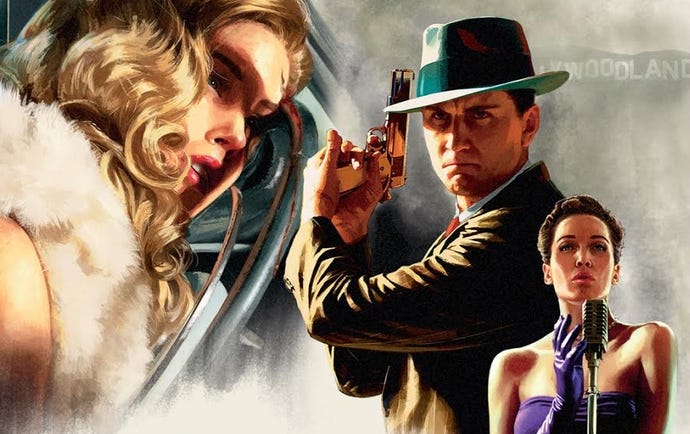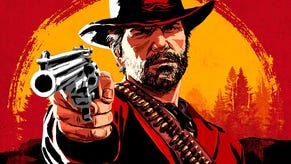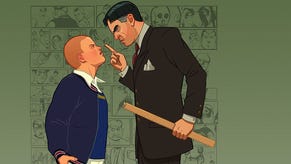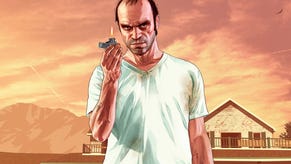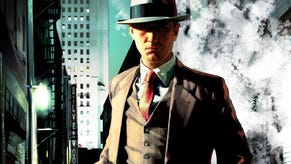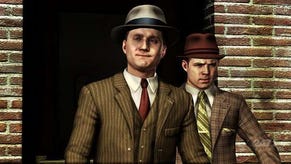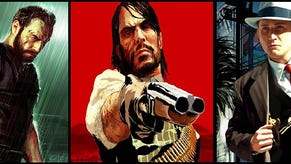Replaying L.A. Noire: you're wrong, and you're just going to have to deal with it
Team Bondi’s game is at its best when the player's messing up.
L.A. Noire feels at home on the Switch. While its appearance can seem compromised on the Nintendo hardware, especially when held up against the PlayStation 4 and Xbox One versions of the 2011-debuting game, released simultaneously a few weeks ago, the environmental pop-in, frame-rate dips and slightly sticky controls (okay, so they’ve always been rather imprecise), such shortcomings are forgivable given the platform’s play-anywhere flexibility.
I’ve been taking the life and times of Cole Phelps on the move, on commutes both lengthy and brief; and to bed with me, playing until I’m nudged to turn off the light. And treating the title he’s the ostensible protagonist of (depends on your moral compass, really) as entertainment to be dipped in and out of, like a good book, each new case a fresh chapter of proceedings, has drawn me further into its murky world of 1947 Los Angeles than Australian studio Team Bondi’s one and only game ever achieved six years ago. It transpires that short-session play is, for me at least, the right way to pick apart the many and varied misdemeanours of the City of Angels’ criminal underworld.
And yet, L.A. Noire does its utmost to point the player, as Phelps, down the wrong path. Once the former military man, not long home again after serving in the United States Marine Corps during the Second World War, has earned his spurs in the LAPD as a street-beat rookie (the game’s tutorial phase, essentially), he earns a promotion to the city’s traffic desk. It’s here that Phelps’ intuition is first tested – and his ability to tell right from wrong, and support accusations with previously acquired evidence, is in the player’s hands. You’re supposed to read your suspects’ faces, looking for giveaways of dishonesty, the game’s (still) remarkable MotionScan-captured performances full of the tiniest flinches and twitches. Sometimes it works.
"L.A. Noire simulates what it’s like to be human in high-pressure situations with surprising aplomb: some you win, some you lose"
And, sometimes, it doesn’t. Indeed, frequently what looks for all the world to be the right move really, really isn’t. But what’s great about L.A. Noire, something that I’m only really appreciating on this fresh playthrough (case outcomes suitably forgotten), is that it doesn’t much matter that Phelps, under your command, can play bad cop at a time when a little understanding might’ve delivered a more useful statement. Even when you mess up, the game rolls onward – the guy you had dragged into custody can clam up because your hand’s been shown to be nothing but twos and sevens, but however many lines of investigation hit dead ends, there’s always an opportunity for another shuffle of the deck. Phelps can’t lose – not so early in the game as the traffic desk. And not even when he’s promoted to homicide does the dealer ever really do him a disservice.
Homicide, entirely expectedly, sees the game’s narrative take a decidedly dark turn – and this is your warning that spoilers follow.
L.A. Noire’s homicide section, spanning five murders that don’t initially appear connected but ultimately reveal themselves to be the handiwork of just a single individual who, in the game’s fiction, is the same guy who murdered Elizabeth Short, aka the Black Dahlia. A very real murder case, the Black Dahlia remains one of America’s most famous unsolved mysteries. Short, aged just 22 at her death in January 1947, was severely mutilated – and the same is true (mercifully, to a lesser extent) of some of L.A. Noire’s unfortunate victims. All of the bodies found during Phelps’ spell on the homicide desk are women, some of whom are found naked, all of whom have suffered cataclysmic injuries. It’s a bleak, depressing stretch of the game’s growing-ever-murkier overarching storyline.
Phelps – and partner Rusty Galloway – are given the option of two perps to pin the second case of the homicide desk on. "The Golden Butterfly", named after a piece of the victim’s jewellery (found in the pocket of one of the two who can be charged), can see either Hugo Moller or Eli Rooney take the fall, potentially all the way to the gas chamber. Moller is the husband of the deceased, and Rusty’s got a thing about pointing the finger at the other half ahead of anyone else. Rooney is unsubtly, but never explicitly, presented as a paedophile, and the homicide desk’s captain, James Donnelly, is palpably eager to have him off the streets. But when I come to make a call between the two, flitting between interview rooms to extract all I can from each suspect, I find the evidence stacked against Hugo.
Donnelly blows a gasket. Rooney’s quietly released. Moller stares the death penalty in its grim face, his 15-year-old daughter left to face up to becoming an orphan. The game continues. Another murder, this time a younger woman, not much older than the heartbroken Moller child. A trail of blood leads away from where she’s been dumped, naked, in an alleyway – and following it leads to the discovery of several of her possessions. Whoever committed this heinous act is exhibiting a creative side, a sick flair doubling as a mocking of the police force, that’d evolve into a poetic paper trail, supported by a steady supply of missing victim items (rings, a shoe, a watch), leading to a final standoff.
But before then – before the heavily telegraphed suggestion that these murders aren’t the work of separate individuals, and that the LAPD has the wrong people awaiting trial – there’s a shot at redemption. Another of the homicide desk’s cases, "The Studio Secretary Murder", lines up a pair of key suspects, one a nervous, young bowling alley engineer, the other a would-be renaissance man who looks down his nose at Phelps and Galloway. Naturally, the inclination is to immediately finger the guy with the attitude well above his station, largely on account of him being an insufferable prick; but then the alternative option who had been drinking heavily with the victim prior to her murder, doesn’t have a story that completely checks out either. Donnelly’s getting itchy. Galloway just wants a drink.
"Your wrong steps are hard to read at the best of times; and when you think you’ve cracked both case and the system working away beneath it, L.A. Noire pulls the proverbial rug out from under you"
Bouncing between interrogations, one suspect accuses the other, and back again. My hammer falls on the cocksure, cravat-wearing sonofabitch in interview room two. It is, the game appears to tell me, the right answer. Donnelly doesn’t tear me a new one. I breathe a sigh of relief, and then: another letter, and an excerpt from Percy Shelley’s 1820 play Prometheus Unbound. The 19th century work is translated by Phelps to indicate a location in Downtown Los Angeles, Pershing Square, specifically its fountain. "The local hobos use that as a latrine," comments Phelps’ reliably languid partner, as he – as we – climb into the spray. Another letter, another location, and the hunt is on.
Garrett Mason leads us on a merry chase. But when he finally falls, having been revealed as the murderer of all five women, the place he calls home a disturbing collision of religious iconography and anatomical intrigue, all of our previous work, both good and bad, is undone. Doesn’t matter if you quit out of the game to replay your interviews once a wrong move had been made. Equally, all of those five-star case closures you thought you’d chalked up (don’t worry, the game’s not about to undo your trophies or achievements) now count for nothing. Donnelly arrives, alone, no camera flashes nor press scrum in his wake. You’d think this would be headline news, splashed across the morning papers, dominating the game’s crackly radio waves. No?
No. Because Mason was the brother of a high-standing government official, the captain reveals. "The city owes you both," he says, but we’re to not whisper a word of this to anyone. The men we’d previously arrested and charged, they’re all let go courtesy of some conveniently missing evidence when it comes to trial time. However right you thought you were, too bad, the game tells you: you’re wrong.
And I think that’s a fairly remarkable facet of what is an imperfect but, on Switch at least, second time around, very rewarding game. Your wrong steps, in Phelps’ shoes, are hard to read at the best of times; and when you think you’ve cracked both case and the system working away beneath it, how those faces reveal their true thoughts, L.A. Noire pulls the proverbial rug out from under you. Whether you walked away with five stars or two at the close of an investigation, whether you sent a father with a quick temper or a legitimate pest to their fate, it’s all for naught as the game delivers a thunderous full stop to Phelps’ homicide career.
Being wrong is, actually, part of being right all along. Phelps receives another promotion, of sorts, perhaps more of a sideways step, into the vice department. And the player – by which I mean me, on this return to a game I barely remember the first time (beyond one multi-fail chase sequence that I’ve not reached yet; but you can skip the action-orientated bits you suck at, if you really must) – comes to terms, thanks to clear in-game acknowledgement that not everything here is quite as black and white as you might’ve thought, with the fact that it’s okay to mess up. To rub your captain up the wrong way. To chuck an innocent man in the slammer.
Because that’s life, isn’t it? You make wrong decisions, all the time – and even when you’re on a roll of good fortune, it can add up to absolutely nothing of lasting significance. Maybe you aced that job interview, but guess what – now the position’s been filled by an internal promotion. L.A. Noire simulates what it’s like to be human in high-pressure situations with surprising aplomb: some you win, some you lose. But on balance, somebody will probably come along to make the whole shebang a futile exercise anyway.
